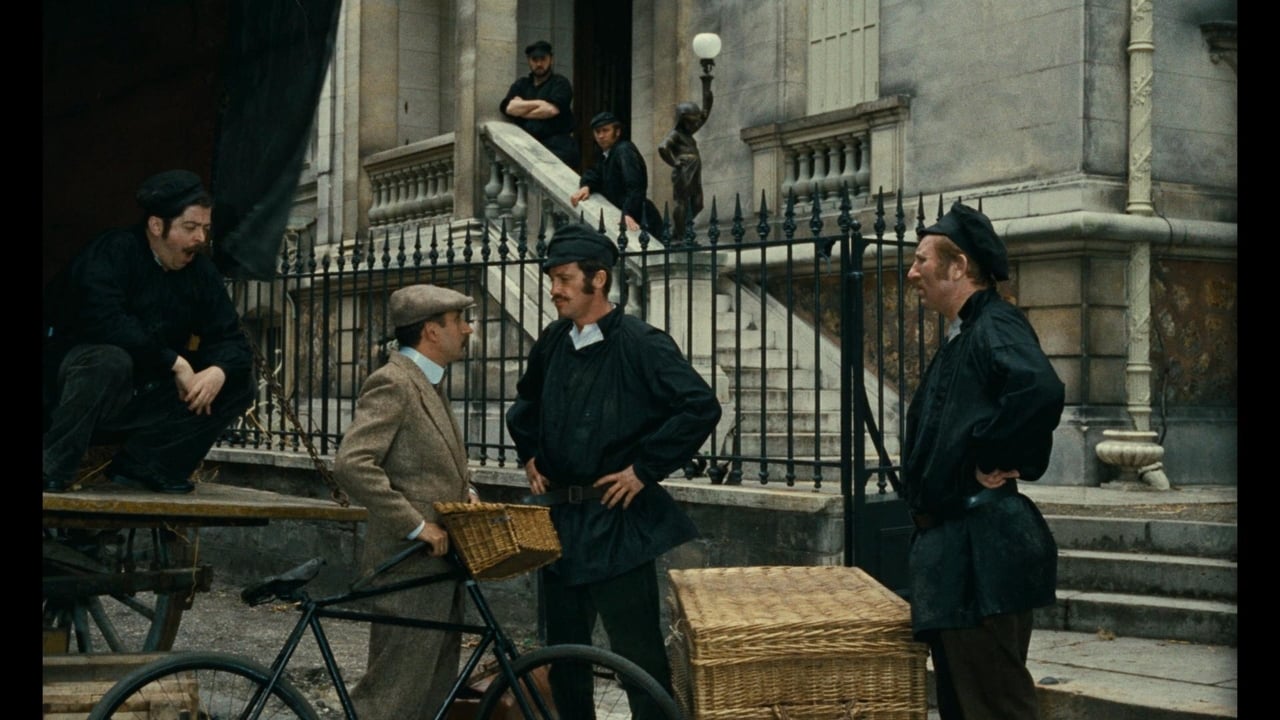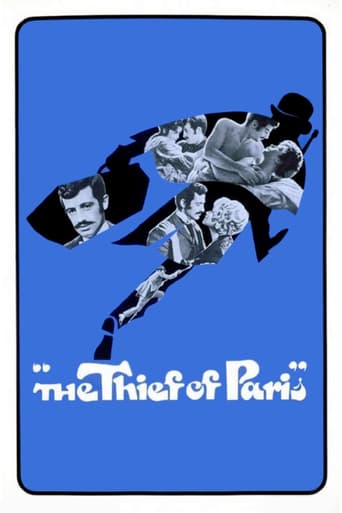

THE THIEF OF Paris certainly is not Louis Malle's most illustrious work, pales in comparison with classics like ELEVATOR TO THE GALLOWS (1958, 8/10), THE FIRE WITHIN (1963, 9/10), LACOMBE, LUCIEN (1974, 8/10), or even his Hollywood legacies as Atlantic CITY (1980, 7/10) and VANYA ON 42ND STREET (1994, 7/10), but it might be his brightest and the most nihilistic. In Malle's film, burglary is not a disgrace profession at all, and Georges Randal (Belmond) is a very promising one, with his bourgeois upbringing and extraordinary composure. His first go is an act of revenge to sabotage his cousin Charlotte's (Bujold) arranged marriage organized by his rapacious uncle Urbain (Lude), who raises him up but also appropriates properties of George's deceased parents. So he has to leave, accidentally joined by two habitual thieves, the priest Félix (Guiomar) and Roger-La-Honte (Le Person). Together, Georges marches on successfully and gets flirty with several women, Broussaille (Jobert), Roger's brothel-running sister in London; Ida (Fabian), one of her girls; Renée (Sarcey), the wife of his college mate Mouratet (Crouzet) and Genevière (Dubois), an unhappily married wife, who also wants to rob her husband blind. Most of the time, the film embraces a nonchalant casualness in the supposedly highly- surreptitious activities, minutely showing viewers the details of breaking-in a villa, prising open a safe box or using caustic acid, meanwhile bourgeois class again is under the lash of Malle's wielding, the ultimate shame is Urbain on his death bed, he has to watch Georges feasibly falsify his will and Charlotte utter that she has no sympathy to him at all. Career hazard matters, particular for thieves, but Georges is the kind (one we are all too familiar with) that cannot stop even he patently comprehends the aftermath, because it is the danger is beckoning them to act, to induce the thrill and fulfillment his life needs, so in the final act, Malle mischievously lures us into a paranoiac game reflected from George's mind, then calmly ends the film, an anticlimax fits this generally unexciting adventure. There are nothing too thrilling for the cast to do either, Belmondo might not be the romantic type, but as rakish as he could be, Guiomar liberates some deadpan seriousness of juggling his holy vocation with mundane misdeeds. Belles are all over the maps (Bujold, Sarcey, Dubois, Fabian, even Lafont in her small part as a very French maid), but never arouse too much frisson in their auxiliary functions, really a pity.
... View More... and those gorgeous eyes to look at. The film would be a lot better if it were 30 minutes shorter, and if Malle didn't lovingly photograph those rich interiors, that gorgeous furniture that Belmondo treats so brutally with his burglar tools. Jacques Saulnier did the production design, and this is a really handsome film to watch. It is a precursor to Stavisky..., the Resnais film that Belmondo starred in some years later, another Saulnier production. The solitary nature of the crimes Randal commits does not allow the idea of a confederation of criminals against the bourgeoisie to develop--this is one of the themes of the script that fails to work.The acting is always good. Guiomar as the crooked priest is always effective; you may remember him longer than you do Belmondo. Paul Le Person as a thief has some good scenes, as does Jacques Debary as the politician Randal robs while he's making a speech. The best scene for me was the Guiomar-Marie Dubois encounter, when she recounts a bogus story to the feigned surprise of the priest.Louis Malle was one of the greatest French directors, along with Resnais and Chabrol, yet he didn't always make the films that his talent should have let him do. Le Voleur is just too ripe, too pretty, too focused on surfaces to work for me.
... View MoreI finally got around to watching a tape of this movie I'd made awhile back, and frankly, I was very disappointed. Jean-Paul Belmondo at the peak of his international fame, Louis Malle ("Atlantic City") directing - how could it go wrong? But regardless, this is just a simple comedy without much depth.Belmondo plays a French thief around the turn of the century, and the joke is that he and his fellow thieves are robbing the bourgeois and making off with their women. No new ground is broken, and to be honest, even with this simple plot, it isn't particularly well-executed.Even fans of Belmondo might be bored with this film - instead of his usual droll demeanor, he's dull and just floats from one scene to another without making much of an impact.So-so entertainment, that's all.
... View MoreJust saw this forgotten gem by Louis Malle today on Starz. I absolutely loved it. I admit I have a huge bias towards movies about thieves: the artistry of their trade fascinates me (and explains why I can't get enough of playing "Thief" the computer game series).Nevertheless, this was an engrossing turn of the century period piece which is filled with brilliant, subtle characterizations of extremely interesting and complex characters. It's exciting without needing to be fast paced and it doesn't sacrifice depth of emotion (which is repressed but fully present under the surface as these characters must constantly re-evaluate their involvement in their chosen lifestyles).The film is beautifully structured so that by the end of it we, who have been voyeuristically caught up in the romance of suave criminals, must, like them, take stock of what has been lost.
... View More